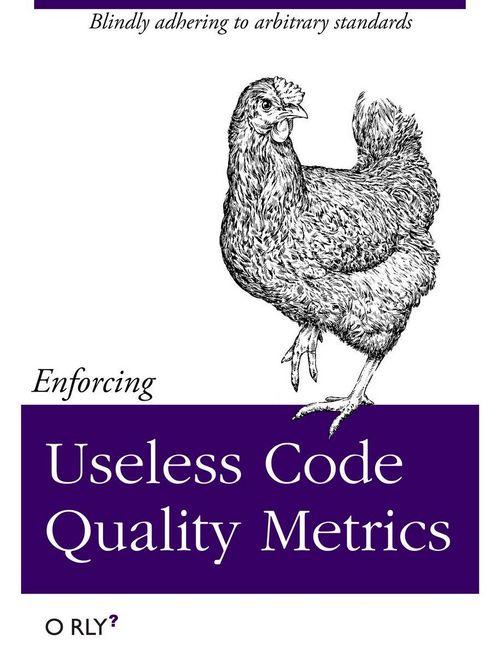
In the grand pantheon of software development, where deities of code and guardians of syntax reign supreme, there exists a lesser-known, often misunderstood realm: the domain of Useless Code Quality Metrics. Here, in this shadowy corner of the developer universe, arbitrary standards are elevated to dogma, and the pursuit of metric perfection becomes a quest as quixotic as it is misguided.
Our tale begins with a young developer named Casey, whose journey into the heart of this realm begins with the best of intentions. Armed with an array of tools and plugins designed to measure everything from cyclomatic complexity to lines of code per method, Casey embarks on a crusade to achieve the zenith of code quality, guided by the shining light of metrics.
But as Casey delves deeper into the realm, a sense of unease begins to take root. The quest for perfect scores on these metrics leads not to the promised land of bug-free and maintainable code, but to a bizarre world where the letter of the law overshadows the spirit of programming. Methods are fractured into micro-functions, each less comprehensible than the last; variables are renamed with a zeal that borders on the fanatic, all in the name of reducing identifier length metrics.
In pursuit of reducing cyclomatic complexity, Casey's once elegant algorithms become labyrinths of single-use functions and classes, each more bewildering than the next. The codebase, rather than becoming a paragon of readability and maintainability, transforms into a cryptic puzzle, where understanding the flow of logic requires a Rosetta Stone crafted from the very metrics that were supposed to guide Casey to excellence.
The turning point comes during a code review with the Oracle of Insight, a wise and seasoned developer whose eyes have seen the rise and fall of countless programming paradigms. The Oracle listens patiently as Casey presents their meticulously optimized code, each line adhering to the strictest interpretations of the quality metrics.
With a gentle smile, the Oracle speaks, "In your quest for metric perfection, you've lost sight of what truly matters: the artistry of coding, the elegance of simplicity, and the clarity that comes from code written for humans first and machines second. Remember, metrics are but tools, meant to serve, not to govern."
Enlightened, Casey returns to their code, this time with a new perspective. Complexity metrics are considered but not slavishly adhered to; lines of code are pruned for clarity, not just to meet an arbitrary standard. The result is a codebase that is not only efficient and maintainable but also a joy to read and work with.
Thus concludes the tale of "Useless Code Quality Metrics," a cautionary story that serves as a reminder to developers everywhere. In our pursuit of quality, we must not lose sight of the essence of coding: to create, to solve, and to communicate. Let us wield our metrics wisely, as guides rather than rulers, and remember that the true measure of our code lies not in the numbers it generates, but in the problems it solves and the clarity it brings.